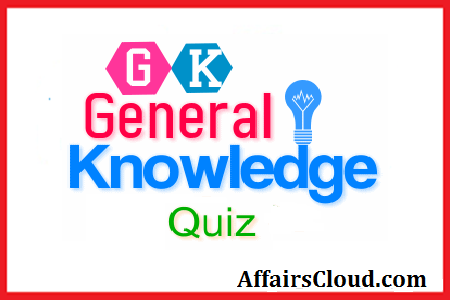Hello Aspirants. Welcome to Online General Knowledge section in Affairs cloud, which is important for all the competitive exams. We have created Some questions related to General Science(Biology) !!!
- Humans are ………………..
1.Autotriphs
2.Chemoautotrophs
3.Archaneans
4.Heterotrophs
5.None of theseAnswer – 4.Heterotrophs
Explanation :
Heterotrophs must consume autotrophs to obtain their energy and are therefore also called consumers. These include all animals from reptiles to humans. - In seed plants, the immature male gametophyte is also known as ………………
1.Cone
2.Sperm
3.Pollen
4.Seed
5.None of theseAnswer – 3.Pollen
Explanation :
As in animals, female and male gametes are called, respectively, eggs and sperm.In the seed plants, the microgametophyte is called pollen - Red blood cells and white blood cells are produced in …………….
1.Red bone marrow
2.Spongy bone
3.Compact bone
4.Yellow bone marrow
5.None of theseAnswer – 1.Red bone marrow
Explanation :
Red bone marrow(hematopoietic) produces red blood cells, white blood cells and platelets - Fats and Oils are …………………….
1.Carbohydrates
2.Lipids
3.Protiens
4.Acids
5.None of theseAnswer – 2.Lipids
Explanation :
The triesters of fatty acids with glycerol (1,2,3 trihydroxypropane) compose the class of lipids known as fats and oils. - Viruses are not responsible for which disease ?
1.AIDS
2.Flu
3.Malaria
4.Cold
5.None of theseAnswer – 3.Malaria
Explanation :
The Plasmodium parasite that causes malaria is neither a virus nor a bacterium - Which is the largest gland in the human body ?
1.Kidney
2.Pancreas
3.Liver
4.Thyroid
5.None of theseAnswer – 3.Liver
Explanation :
Liver is the largest gland in human body. It weighs approximately 1200-1500 g or, on average, one fiftieth of the total adult body weight. - Food is normally digested in the ……………………
1.Small intestines
2.Large intestines
3.Liver
4.Stomach
5.None of theseAnswer – 1.Small intestines
Explanation :
As the food is digested in the small intestine and dissolved into the colon, where they remain, usually for a day - Ricketts is a disease of ……………………….
1.Tissue
2.Bones
3.Eye
4.Ear
5.None of theseAnswer – 2.Bones
Explanation :
Rickets is a childhood bone disorder in which bones soften and become prone to fractures and deformity. Rickets is a disorder caused by a lack of vitamin D, calcium, or phosphate - Fats are stored within specialised cells called ………………………..
1.Adipocytes
2.Epidermis
3.Epithelium
4.Liver
5.None of theseAnswer – 1. Adipocytes
Explanation :
Fats are stored within specialised cells called adipocytes. Fatty acids and glycerol are converted into triacylglycerols (triglycerides) which are stored within the adipocytes primarily as an energy store. - …………………………….of the Endocrine glands is known as master gland?
1.Adrenal
2.Spleen
3.Pituitary
4.Thyroid
5.None of theseAnswer – 3.Pituitary
Explanation :
The pituitary is an important gland in the body and it is often referred to as the ‘master gland’, because it controls several of the other hormone glands
AffairsCloud Recommends Oliveboard Mock Test
AffairsCloud Ebook - Support Us to Grow
Govt Jobs by Category
Bank Jobs Notification



